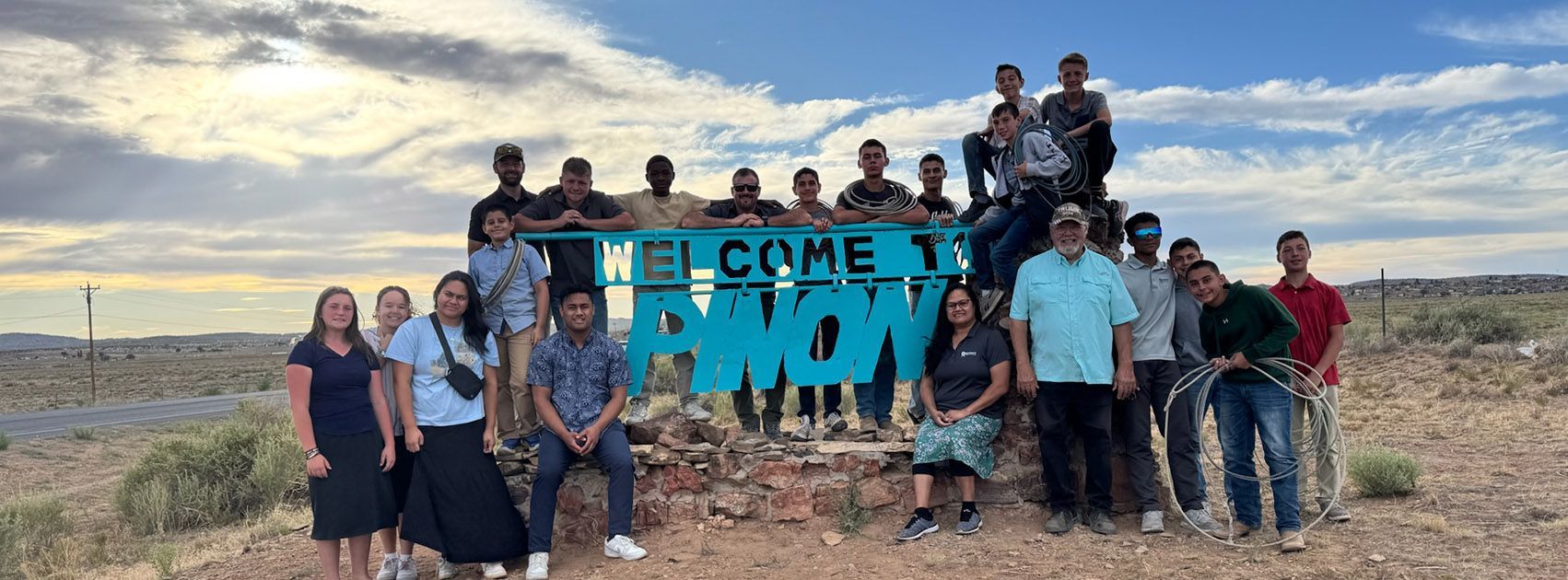
A COMMON GENE There are a few common traits in each of us, placed there by God, that give us common ground. We ask the same questions: “Why am I here?” “Where did I come from?” “What is my purpose?” We share similar fears: “Will I die soon?” “Do I have what it takes?” And I believe we have similar desires. You often hear people say, “I want to make a difference with my life.” That desire wasn’t created by some nonbelieving Hollywood writer. These thoughts and feelings were given to you by God, and they have a purpose. Everything God has placed within you is meant to draw you to the knowledge of His existence and His grace. Recognizing these truths—made clear to us all the way back in the Genesis account of Creation—helps us understand that these feelings and desires were planted by Almighty God and should be nurtured as we seek His purpose for our lives. Let's Build Something for God! A MORE PERSONAL NOTE For many churches, the beginning of January is a time to share vision, present future plans, and renew commitment. For our church, on Sunday night, January 11, we presented a prayer that exceeds our ability. The theme for 2026 (and beyond) for Regency is “Let’s Build Something for God!” This prayer reflects a burden that has been on my heart for some time. God has allowed us to develop plans to prepare for a potential building on our property. Our desire is to build something for God that will facilitate the goals of our ministry and enable us to minister to people for generations to come. Would you pray for us? We want to build something for God! GOD IS FOR BUILDING PROJECTS Re-read that statement—but don’t think about a building. Think about your life. You are God’s project. Ephesians 2:10 describes us this way: “For we are his workmanship, created in Christ Jesus unto good works...” God has a work He wants to do in each of us. Here’s what we must realize: everything God is doing in our lives is for the purpose of building us into the person He created us to be. When I presented this project to our church, I said, “Building projects build people.” That’s what excites me most—both personally and for our church. Whatever God is putting in your heart to do for Him, do it by faith. There is something God is trying to build in your life. Problems arise when we lay down the hammer and set aside the tool belt. A stagnant project is a dead project. Let's Build Something for God! What are you going to do for God in 2026? Maybe your witnessing needs to be revived. Surely, we all desire a deeper relationship with God than ever before—through His Word and in the prayer closet. Perhaps your commitment to God needs to be reignited. Christians across the world who determine to build something in their lives for God could bring about a revival unlike anything we’ve ever seen. This is a matter of personal responsibility. Will you pick up the hammer in your life and get to work?

Our family was driving home from church the other night and as we pulled on to our street, our kids commented on the Halloween decorations that covered houses in our neighborhood. For Christian kids, their comments were interesting. They said, “They have Halloween decorations. They are bad people”. My wife and I quickly chimed in and explained to our kids that most of our neighbors are not saved, and while they may not necessarily be good people, they simply do not understand the truth about God and the devil and that we should pray for them to be saved. Interestingly, Christians are quite divided on the issue of Halloween. Churches have their “Trunk or Treat” events. Some dress in costume. Some do not. Some treat any fellowship on October 31 st as a union with the worship of the devil’s day with non-believers. Some provide alternative fellowships like fall festivals that do not have costumes, ghouls, and skeletons, but provide activities like hay rides, apple bobbing, and corn hole. Not all religions are as divided on this issue, but Independent Baptists seem to especially have a variety of stances on how to treat this holiday. Disclaimer An important disclaimer to this subject must be said. This is not necessarily a gospel issue. As Christians, we live in the world, but we are not of the world. How we operate and live in the world will preach a message, and we are going to differ on many issues in this life. Grace should be readily given to a number of these issues. While I do not give grace to false preachers of the gospel, I’m also not going to demonize a church for holding a “Trunk or Treat” event that does it in good taste. I personally don’t promote that with our church. For years, we’ve held a “Harvest Party”. People don’t dress up and we have a sweet time of fellowship. I am more opposed to those that use the liberty excuse to dress up as R-rated horror movie characters though. Moreover, I do personally give a measure of grace to my fellow believers on this issue. However, the reason for this article is to highlight the fact that we must be vigilant. Too many of our decisions have been flippantly exercised to appease our conscience when indulging in worldly pleasures. “It’s not that big of an issue” is too often shrugged. What your church did on Halloween may not be the subject of contention on your death bed, it is worth noting. Where did Halloween come from? It really is a melting pot of traditions and practices. Some say it is from a Celtic belief and practice where the God of death would come and gather the dead souls together around this time. Some say it is from certain European traditions where a visitation from the dead would be around this time. Some say that Catholics have a part in the origin. The one thread that continues throughout these sources is that they are all connected to the dead in some way. In some origins, it was pagan beliefs and practices. In others, it was prayers and rituals for the dead. The reality is that what is practiced in modern America with Halloween is loosely, if at all, connected to these origins. With a select number, there may be. With most, these origins are unrealized. Origins don’t always dictate how practices continue. Several holidays would have this truth as well. Halloween Today Without the label and the date stamp of Halloween, most of the practices that people participate on generally seem to be positive from the outside. People gathering together, kids getting out and talking to their neighbors, candy and goodies being passed out to strangers in a fun way – on the surface, these are all pretty harmless. Now, when you add the blood, guts, gore, and severely inappropriate pieces to this, it changes drastically, but the sheer nature of what people do on this day certainly seems to have a great disconnect with some of the possible origins in other cultures with Halloween. This is not a shrug to the obvious evil, darkness, violence, and immorality present on Halloween. The kids version of Halloween seems pretty harmless, church’s fellowships and events seem to be very positive, but there is clearly another side to this day that involves immoral parties and wicked practices (whether genuine or not). The Day of the Dead I John 4:1 – “Beloved, believe not every spirit, but try the spirits whether they are of God: because many false prophets are gone out into the world.” There is a clear connection with Halloween and the Day of the Dead. This is practiced widely in Central & South America. They believe that the spirits will come visit them on this day. Rituals are performed to contact their relatives in their homes and in public places. The Disney movie, Coco, (which I have not seen or allowed our children to see) is a clear whitewashing of this day to draw innocence to this pagan practice. The Day of the Dead is a bit of a mixture of Catholic and Aztec practices, while Catholic church bells are often the ones that are used to announce the arrival of these spirits of the dead family members and saints that are “arriving”. It is a clear damnable practice that should be completely opposed as Christians. I’m glad for the missionaries that we have in Mexico and in other places that we pass out thousands of tracts during these parades and festivals to give the truth of the gospel in the face of this abominable wickedness. Principles & Truths to Consider Not all practices that were practiced by pagans are pagan and sinful . This can easily be abused. Pagans going around singing does not mean that Christians going around singing during a certain holiday are sinful. Many of those that dress up and walk their neighborhoods on Halloween are not indulging in pagan practices clearly. The appearance of evil should be avoided at all costs . I Thessalonians 5:22 states, “Abstain from all appearance of evil.” Cue the spider webs, skeletons, vampires, pop culture figures, and ghosts. None of this should be excused are accepted as Christians. You can argue whether a princess dress is appropriate for a five-year-old girl because it happens to be October 31 st , but dressing up as Frankenstein should be a no-brainer as a believer. The end doesn’t justify the means . Proverbs 14:12 says, “There is a way which seemeth right unto a man, but the end thereof are the ways of death.” This Proverbs gives a principle that can apply to a myriad of scenarios. We are wise to consider if our methods are Christ-honoring. I don’t personally ever see our church having “Trunk or Treat”, but I’m not really against those who do. I do believe there is a line we are careful not to cross on these days, and we should be careful to be mindful of our methods just as much as our results. Separation doesn’t make you a Scrooge . Forgive the Christmas reference. You are not a downer because you refuse to put up skeletons in your front yard. Many opportunities arise in the world that give Christians a clear way to shine for Christ while the herds move in an opposite direction. Halloween would certainly be one of those examples. Offer grace and stand firm. I believe in holding firm and true to convictions while also being gracious to other believers. I have no problem with calling out the debauchery and evil that takes place on Halloween, but I also have no problem offering a measure of grace (that I hope is reciprocated) to those that don’t follow every standard that I hold to. Strive to honor Christ and to be gracious to fellow believers.

Focus on the Family published an article that dives into the link between the modern social media world and the unfiltered, hyper access for married people to cross emotional and soon physical lines in their marriages. It reads, “Licensed marriage and family therapist George James, president of communication group George Talks, adds that people often use the virtual aspect of social networking and digital communication as justification for starting these relationships. That’s reason to take caution, James says, because this blend of physical separation and instant connectivity enables people to disconnect from everyday life and engage with another human being. "The screen feels like a boundary," he says, "where people can feel like they are not doing anything wrong because the person is not there with them." K. Jason and Kelli Krafsky, joint authors of Facebook and Your Marriage , warn about how quickly former emotions can reignite online. "With access to an old flame’s profile, contact info, pictures and private ways to communicate with one another, a brief trip down memory lane can turn into camping out, reminiscing over memories and rebuilding the emotional bonds that once existed," the Krafskys say. Ephesians 5:15 commends, “See then that ye walk circumspectly, not as fools, but as wise,” The kind of interactions, posting, and viewing on social media has opened up the devil’s attacks towards men and women alike. Circumspectly is not how I’d define most of what we see online. Many view their interactions through their screen often as harmless because conversations and interactions are not in person but behind a screen. Lying in bed liking pictures of someone that isn’t your spouse, being alone late into the night texting the opposite gender and secretly messaging those that aren’t your spouse are just a few examples of the dynamite that many play with in the social media world. PRECAUTIONS Most of the dangers and temptations that come from inappropriate social media use could be greatly avoided with simple precautions that Christians can and should take. 1. Do not message the opposite gender in secret. Teens should absolutely not be messaging the opposite gender. Married people should not be messaging those that aren’t their spouse of the opposite gender in secret. Rather to be overboard in this area than to be vulnerable to temptation or even slander. Group messaging is not difficult. My wife and I include each other in messages with other people all the time. I’ll either text a husband and wife together or I’ll message someone with my wife in the message. I have never found anyone to be offended by this, and it is an easy and obvious option to keeping communication above board in the comfort of your own office, vehicle, home, or bed with someone that you need to be on guard with. 2. Consider not following those of the opposite gender. I didn’t get social media really until after I was married. Like most people, I started to follow pretty much anybody and everybody I knew that would accept my “friend request” . That quickly changed. I know not all platforms are the same, but most platforms provide some way to post pictures. I remember opening my phone one morning and seeing some woman posting her new hair style or outfit or whatever it was, and I felt wrong (it wasn’t even that it was an inappropriate picture). It felt like that woman sent a selfie of herself to my phone for my viewing. I made a decision that day that I would not follow women that were not family. The only exception that I’ve made to this would be some political or new individuals (these cases are rare or more about following an organization, not an individual). POTENTIALS There are potential dangers that one should be aware of when it comes to messaging the opposite gender: 1. You can be accused for what you cannot deny. The quality of being blameless is a wise route for someone that wants to be clear of the #metoo headlines. While many ungodly people have been revealed for the hypocrites and evil people they are, I also believe many have been slandered in ways that are almost irreparable because they were accused for something they could not deny. Guardrails not only keep you safe from falling into temptation, but they also keep you safe from slander. My wife is included in this as well. She won’t have to worry about my eyes and my communications if these guardrails are put in place. 2. You can be opened to what you cannot resist. Sober and vigilant are the terms that God uses when He tells us about the roaring lion that is the devil that is out to destroy our lives. A burglar doesn’t need every door and every window open to get into your home, and Satan doesn’t need every area of your life open as well. He just needs one weak point of entry. The flesh is weak, and you need to come to grips with what your flesh can be capable of. Be wiser than those who scoff and defend, “You’re reading into this too much. It’s just a friend. I would never…” I’m sure those that ended their marriages in ruin thought and said the same thing at times. Your purity and the integrity of your name are worth the extra precautionary steps to put yourself on guard in the area against digital infidelity.

NEVERLAND IS A FANTASY The old cartoon Peter Pan was about a fantasy land where kids never grow up and they never have anyone telling them what to do. It’s no wonder why this movie and other Disney films that captured the minds of so many kids around the world. Families gather around to watch an “innocent” cartoon, but when the TV turns on, those children are reminded that Neverland is not a reality. If a child told his parents, “I want to live like Peter Pan where kids never grow up and never have to listen to anyone”, his parents (if they are good parents) will tell their child that they can believe in a fantasy land if they want, but it’s not going to make it a reality. Kids do grow up and we do have authority and responsibilities in life. LIFE IS NOT A COMPETITION Social media can be a breeding ground for covetousness. What social media really presents is the personal highlight reel of someone’s life. If we’re not careful, we compare the reality of our lives to the highlight reels that pop up on our devices every day. The result is a spirit of comparison. Comparison is the enemy of contentment. How someone looks, how their life seems, how fun their stuff seems – all of this can stir the wrong kind of spirit in a believer. REJOICE WITH THEM Sadly, our response to those that we see on social media can grow resentment in our hearts as well. Instead of rejoicing at the blessings of others, our competitive flesh kicks into hyperdrive. And if we don’t get to the picture that they’re presenting, then we not only get discouraged, but begin to resent their successes and blessings. If someone is able to take a vacation, rejoice with them. Don’t subtly imply, “It should would be nice if I was ever able to get away like you”. There will always be someone online that will one-up whatever you have, wherever you went, or however you look. Don’t resent them for it. Rejoice with them. Romans 12:15 says, “Rejoice with them that do rejoice” . WEEP WITH THEM Mourn with others. The sadness and gloom that we are told about because of the lightning-fast news source in our hands can make a sunny, beautiful day into a dreary one. It is a challenge in the day that we live in to have the knowledge that we have of specifics details, faces, and examples of wickedness and hurt, especially if people don’t know what to do with their hurt. Romans 12:15 continues, “ …and weep with them that weep ”. If we’re not careful, we can become desensitized to the hurt because it’s constant. You don’t have to show someone that is hurting the story of someone else you follow that has it worse. Just be there for them. You may not be able to be a comfort and a friend to everyone in the world, but if there’s an opportunity that social media provides it is personal access to the hearts of billions. Use it for good in any way you can. You may not get noticed by commenting on a celebrity’s post, but there are Christians and lost people all over that you may be able to reach and be a friend to. Live in the real world, even when you’re looking into the fantasy land that is often represented by social media.

Privacy Protection Needed One of the glaring errors of the social media, everyone-is-connected society that we live in is the voluntary surrender of personal privacy. From photos of what people are eating for lunch to documenting every square inch of our homes for the public to prey upon, there is a great amount of wisdom for our generation to gain in this area. To put it plainly, there are some parts of our lives that should be kept out of the public eye. The Greatest Gossip in the Church Do you know where to find good gossip in the church? Go to the children’s classes during prayer request time. You’ll hear little Johnny and Susie tell their teacher all about how mommy and daddy raised their voices at each other. They’ll tell you how many spankings their little brother got, and they’ll open the closet and gladly share every skeleton they’ve seen. Airing Dirty Laundry Unfortunately, there are many childish Christians all over social media airing the dirty laundry in their marriages and in their churches. If you don’t believe me, go to your local neighborhood app and see the display of meaningless gossip going on with your neighbors. I get saddened, and that pity turns to frustration quickly when I see wives complaining about their husbands online, even if it’s supposed to be humorous. Then we see church people pulling out the clothesline of all the church drama and every scandal that’s gone on all across America. The comments section welcomes everyone to “speak out” in the mask of being virtuous and courageous. The Bible Has the Answers The Bible gives a model for how we deal with problems in the church in Matthew 18. 1) Go to the person directly. 2) Take witnesses if they won’t listen the first time. 3) Take it before the church. Yes, there are the Minor Prophets who addressed national issues publicly before the people, and that will have it’s place. However, I’d argue that we err way to far on being too public opposed to being too private. Bloodthirsty Wannabe Prophets Dealing with private problems privately is not sweeping sin under the rug. I fear that we have become bloodthirsty savages when it comes to dealing with the sin of others. Until we see pain and blood, we are not satisfied. YouTube videos are made. Then response videos are made. Posts are shared. Comments are flooded. And before you know it, there is an archive full of videos, blogs, and posts for parties that are not involved, have no reason to be “in the know”, and many of whom are lost with a front row seat on the action. Let me offer some wisdom regarding dealing with problems in our social age: 1. Private problems should be dealt with privately. If a Christian is struggling with a sin and they go to a spiritual leader for help, that leader is good to help that fellow in a private matter. Most of us wouldn’t argue this, because we’ve all been there. 2. Public humiliation can remove the possibility of restoration. When personal problems become public merely because of gossip, it humiliates people. Now, I do believe there is a good side to this. This kind of shame can also lead a person to real repentance. The wisdom that is needed is to know when it is necessary to deal with a private problem privately and when to deal with it publicly. 3. The testimony of Christ and the church is harmed. Public fighting online is like have a guest over for dinner while mom and dad are arguing over the dinner table. It’s awkward, uncomfortable, and makes that person that is not a part of the family wish that they wouldn’t have to come back into that arena again. What do we expect the world to feel and respond when they see our comments in California on the scandals going on in a church in Florida? 4. The church is a place of authority and help. Matthew 18 and the model of the New Testament is a clear indicator that God has given a great help to us through our local church. Most would rather pay a therapist that they won’t see on Sunday, but you have a God-ordained helper in your pastor, spiritual leader, and fellow Christians in your local church. 5. Public problems should be dealt with publicly. I Timothy 5:20 tells us that there is a time and place for public discipline. I don’t know if the interpretation of that text would infer that you need to make a YouTube video on what you think about a preacher who has been dead for twenty years. I don’t know if this even means that you need to comment on what’s going on in the church split on the other side of the country that you read about on Facebook. I do believe that this does mean that a pastor and a church have an obligation to address matters before the congregation in a Spirit-led and in a Biblical manner. I’ve had the unfortunate responsibility to use our pulpit for such occasions, and, while these moments are uncomfortable, they are far more profitable than the banter going on in the comments section on Facebook.

“All death can do to the believer is deliver him to Jesus.” -Charlie Kirk Words are to the Christian like tools are to the construction worker. It is not our fists or our muscles that give us strength in the spiritual battlefield, it is the power of our words and the Spirit of God that uses them. If there was one person that had a master’s degree with his words, it was Charlie Kirk. He was a devoted husband and father, and a young man passionate for his nation from an early age. Charlie reached the spotlight at a young age, most significantly with his organization, Turning Point USA. However, I’m sure that if he were still here, he’d tell you that his greatest joy came from serving his family and the Lord Jesus Christ. “When we stop talking to each other and arguing our differences, that’s when people turn to violence, and I’m trying to prevent that.” -Charlie Kirk Martyrdom almost feels like a foreign or historical term as an American. It’s something we read in our history books or read about in the news, but it has not been a reality for America for much of its history as it has for so many other nations. Yet, on September 10, 2025 (on the eve of 9/11), Charlie Kirk was gunned down in broad daylight on the campus of Utah Valley University doing what he does best, being a warrior with his words. Charlie reached millions, if not billions, with his videos – just having conversations with others, mainly young adults about age old questions that pertain to the truth. For that – our 1 st Amendment rights, for his words, which he was most known for sharing gracefully – he was killed. Charlie Kirk was murdered for having beliefs and speaking about them. That statement alone feels foreign to write as an American. ( When asked how Charlie would want to be remembered if he died) “I want to be remembered for courage for my faith. That would be the most important thing. The most important thing is my faith.” -Charlie Kirk Charlie caught my attention several years ago, and I’ve been a fan from afar. The mystery of our generation is how we can feel so connected to someone that we did not know personally, yet we can feel like they were a close friend. Charlie wasn’t some actor playing pretend on the big screen. He used cameras, social media, and his show to capture conversations and allowed millions to join in to the conversation. Charlie was gifted in debate, and in many areas, I would agree with his beliefs about the gospel, conservative, moral, and biblical values. No two Christians are alike, but Charlie was a breath of fresh area in an area where many have viewed politicians to be a lost cause, even those who claim to have some kind of “faith”. It comes to no surprise that many have admitted that they would have voted for Charlie for president had he had the chance to run. I would have been one of those people. “Stop being a boy and become a man. If you want to know what that means, come to church.” -Charlie Kirk The assassination, the murder, the heinous and evil act that took place on September 10 made Charlie Kirk a modern martyr for the Christian faith. This act has cemented what we had thought was a foreign concept to many and that is this – persecution is here for Christians in America. The scale is uncertain. The end is unclear. But our mission is as clear as ever. We must continue to speak the truth – most importantly, the truth of the gospel and the truths given by the Word of God. Charlie was a warrior of words, and he used them to his advantage. However, it wasn’t a skill of manipulation or deception. The words that he spoke were largely backed by the truth of the Bible, not just the ideas of man. Charlie’s life can be picked apart like any other human being, but I choose to recognize what he knew his greatest mission was, and that was spreading the truth of the gospel. “Jesus defeated death so you can live.” -Charlie Kirk “Jesus is enough, you are not enough.” -Charlie Kirk While in college, I remember a pastor saying to a group of young men – “I do not measure a man by his ministry, I measure him by his marriage.” For the reasons that I do not respect many conservatives, Trump included, those are the same reasons I respect someone like Charlie Kirk. He was a family man that is mourned by a wife and two beautiful children because of the devoted father that he was. A video has circulated of his daughter running shyly in his direction, and when she gets close enough, she picks up speed and runs boldly into her daddy’s arms. As a father of three girls, that video has struck my heart the most. To take that away from two children is an act done only by one with a black heart. Erika and their two children will need an extra measure of grace to fill Charlie’s role in their home, because God designed little girls to need their daddy’s. And they need them desperately. Charlie was a strong promoter of the family, and aside from the gospel, and especially next to politically conservative views, that is the most important to a strong nation. The attack and collapse on the family in America is what will lead her to her demise. That is what Charlie was fighting to stop. This was also emphasized in his wife’s first public speech since her husband’s death. “More people should get married young and have more kids than they can afford.” “The happiest women in America are married with children.” “Having children is way more important than having a good career.” -Charlie Kirk When the years pass and cultures and empires continue to shift, our legacy will be cemented. If there’s one thing that moments like this should bring to our attention it is the same question that was asked to Charlie Kirk – “how will you want to be remembered?” - Be remembered for speaking much of the gospel to anyone that will listen and compelling them to hear the truth. - Be remembered for your love and integrity towards your family. - Be remembered as a faithful member of the body of Christ, no matter where your work takes you. - Be remembered for doing all that you can to fight evil and to be bold and courageous for Jesus as He was bold for you. - Be remembered for giving your life for others. “Good men must die, but death can’t kill their names.” -Charlie Kirk

Every generation has its marks that people remember them by. Proverbs 30 describes four types of generations. Verse 13 describes one generation this way – “There is a generation, O how lofty are their eyes! and their eyelids are lifted up.” If there was a simple, yet accurate description of the generation of young people and young adults today, we could call them the selfie generation . Solomon may have said it this way – “There is a generation, O how many selfies fill up their cloud data. Their filters wash their imperfections and appease their insecurities with every like and comment.” Selfies are not just a type of photography; they are the way of a generation. A study ten years ago showed that women ages 16 to 25 spent about 5 hours per week taking and editing selfies. Many will obsess over the angle, the lighting, the position of their hair, the background, etc., etc., etc. This screams insecurity! More accurately put, this can be called “selfie dysmorphia”. This is the obsession with perfecting the imperfections with a filter, an editing program, or lighting manipulation. A generation of girls (and boys) have grown up looking into a lens that isn’t concentrated on God’s landscape, others, family, and helpful information, but a lens looking right back at themselves. This is a recipe for disaster for many, but especially for young people! The greatest error that one can make with social media (in my humble opinion) is the promotion of self . I personally get bothered with even the title of influencer. Because 99.9% of these wannabe celebrities find their fulfillment in the adoration of a following that can hardly be characterized as real relationships and a life that is strictly digital. This is not to say that posting anything online of us is wrong, but it’s quite easy to find accounts that are filled with self-portraits, varying from borderline nudity to a cringey “look at me” posterboard. Before you get defensive and accuse me of ranting about a pet peeve, I’d encourage you to study what Proverbs and the rest of the Bible says about the elevating of one’s self. Proverbs 27:2 says, “Let another man praise thee, and not thine own mouth; a stranger, and not thine own lips.” And no, that doesn’t mean posting a selfie and waiting for all of the comments to flood in about how stunning you look. Selfies scream for an invitation for praise, and that’s why people share them most of the time. My heart aches for the young girls in our generation that think that they need to become a social media phenomenon and will sacrifice the purity of their bodies for the praise of strangers online. Too many girls are marketing their bodies for free for perverts and reprobates. Each generation can do better, and parents can do better to monitor this. Parents, don’t let your children take a lot of selfies, whether they post them or not. This should be a huge red flag to the internal thoughts and battles that your kids may be facing. Nothing good will come of it. Parents, don’t let your children post a lot of selfies. I’m not accusing a selfie of being sinful, but excess in this shows signs of depression and severe insecurity issues, not to mention safety concerns. Women, I beg you to have discretion with your social media. Get a man’s opinion (a godly man) on your account. If he’s willing to tell the truth, he’ll tell you what can appear to give the wrong message. You do not need a thousand digital followers to make you feel beautiful and special. If you have a man at home who made sacred vows together with you, then there is only one person that you should need to fill that void in your soul. Men are normally the smallest group in this area, but this is a concern for all ages and genders. Men shouldn’t need praise from the world, nor should they feel the need to display their masculinity for others to praise. This is not a call for a ban of any picture/selfie of yourself that you may have on your accounts. I would be hypocritical if that were the case. This is, however, a call for visiting an area of concern with how we view ourselves, where we find the solution to fix the insecurities that many will face, and showing wisdom with how we portray ourselves for free for the public to see. The studies in this area are not Christian and they are not very complex to understand. Social media should not be used for self-promotion, or you will pay the consequences for it in your heart and with your relationships. I guarantee it.

READY FOR A RIDE? Imagine you are getting on a roller coaster and at the entrance there was a sign that said “Side effects likely include obesity, mental health issues, sleep deprivation, social incompetence, attention problems, anxiety, depression, addictions, delayed speech and reading, motor deficits, eye damage, and musculoskeletal disorders.” Would you get on the ride? The roller coaster that I’d like to present to you is the social network and the social experiment we are all a part of. Think about these next couple statements. Iowa State University psychology professor, Douglas Gentile, said, “It’s been getting harder for parents to really monitor a lot of what their kids are seeing and doing. At the same time, they’re relying on the seeming benefit of being able to quiet the kids at a restaurant with a device…We may be building a bit of Frankenstein’s monster, because we’re using that power for our benefit, not for the child’s benefit.” Google design ethicist, Tristan Harris, said, “There are a thousand people on the other side of the screen whose job it is to break down the self-regulation you have.” REALITY CHECK Between 2012 and 2025, teens owning a mobile device went from 41% to 95%. Teens using social media several times a day went from 34% to 70% and teens having some kind of social media is at 93%. More than half of these adolescents visit TikTok daily and about 73% use YouTube daily. We are living in a social experiment. Only time will tell the effects that the social network will have on our youth that are being raised to aspire to want to be influencers more than they want to be doctors, preachers, and enter the real work force. I won’t be the voice to cry “the sky is falling” every time there is a new trend or social media app, but we also can’t ignore the dangers that we are facing with more access and connection than ever before. Ease of access is the reason that children are being exposed to pornography earlier than ever before. The internet has skyrocketed the child trafficking industry. More and more girls are tempted to create their own fan page online and sell their body to strangers as they claim their “independence”. These realities should shake us to our core. THERE IS HOPE Here’s some good news. Whether it’s a famine, market collapse, or a technology that changes the way the world lives, God’s Word has the answers. For the next several weeks, I’d like to offer some wisdom from God’s Word on the subject. May I also point out that this wisdom is not just for teens. You’ve seen the dating or even marriage couple on a date at the restaurant on their phones instead of focusing on one another. Sixty-six percent of adults in married or committed relationships report that smartphones and social media sites like Facebook play an integral role in their lives. 40% of spouses say that they are bothered by how much their spouse is on their device. The effects of users that use social media without wisdom and understanding can lead to a number of problems such as obesity, anxiety, depression, sleep deprivation, cyberbullying, and much more. However, there is hope. When God wrote the Bible He knew that we would live in this era and face the problems that we call modern and new. The wisdom from His Word is as relevant to the wannabe TikTok influence as it was to the blacksmith and farmer of years past.

Worldwide missions is the conclusion to the ministry and work of Jesus Christ that can be found in the closing of each gospel and at His ascension in Acts 1. While I am a patriot, I am a Christian first. Nations and powers will change and fade, but the need for eternity remains the same. Recently, I led a group from our church to the Navajo Reservation, the largest Indian reservation in the U.S., in Arizona for a summer missions trip for our teens. I didn’t take my first missions trip until 2022, and it made a profound impact on me. Some wrongfully view missions trips as glorified vacations or somehow as a way to appease our American sympathy towards the less unfortunate. This blog is for those who have taken a missions trip, those who are considering taking a missions trip, and for anyone that shares the heart of our Saviour towards the souls of the world. Not everyone will have these opportunities, but I would challenge you to consider joining your church or even taking a personal missions trip for the following reasons: 1. It will change your worldview. “USA all the way!” – We cheer it, and I love it. But in Heaven, Olympic medals and national anthems won’t be played. I don’t believe it’s wrong to be patriotic, but that spirit of competition and comparison can be cancerous to the heart of missions if we don’t put it in its proper place. The goal of missions isn’t to Americanize the world; it is to evangelize the world. 2. It will stir compassion in your soul. Jesus was moved with compassion because He looked with His eyes upon the people. Walking through the Amazon jungle, exploring the streets and alley ways in San Paulo and Rio de Janeiro, travelling through Mexico, and exploring the Navajo Indian reservation, my heart has done somersaults as I’ve seen the surface of the great need in these areas. It’s also reminded me how we can become so desensitized to our own areas because it’s the “norm” to us. Instead of seeing streets, houses, roads, and sites, we must learn to see souls that are slipping into one of two sides of eternity. If you have any heart for God, I promise this will have a powerful impact. 3. It will open your eyes to the darkness. I have a soft spot for two kinds of missionaries: those that are involved with translating the Bible into languages that have no written copy of God’s Word and those that are going to a field that has little to no gospel witness. These pioneers remind me of the missionaries that we read about in books of yesteryear. Recently, we visited an area that had no established gospel preaching church until just a few short years ago. Now, there have been several churches that have been started. In a land where we pass a dozen churches on the way to the church of our choosing, it can be eye opening to see how big of a need there is around the globe. While we face church hoppers that move across town when they get upset, some are living in darkness with zero options other than a false religion. 4. It will connect you with other believers. Isolation can be a real feeling in Christianity. If we’re not careful, we look at our cities and think, “Is anyone else trying to do what we’re doing?” I’ve enjoyed spending time with missionaries in each field I’ve visited. Some have been missionaries that our church supports, and some I’ve met for the first time. Those conversations have encouraged me and I’ve been blessed to connect with each of those believers. Truth be told, a lot of those conversations were with the people or natives in those lands, not just the missionaries that were called there. I’ll treasure those moments for a lifetime. 5. It will make you more soul conscious. I am a big believer in that missions trips should not be glorified vacations. The purpose of the trips I’ve taken is for ministry. Along the way, I’ve seen some amazing sites, but the sites are not the purpose. The purpose is the people in those places, and the purpose isn’t to bring them food, water, or houses. Those may be methods to open their hearts and to draw them out. The purpose is to preach the gospel. Each trip I’ve taken, we’ve seen many souls saved and that is always the highlight of the trip. 6. It will produce gratitude and contentment. Nearly every culture and race around the globe has greater difficulties than us Americans. America has its faults and failures, but the standard of living in American is so much higher than much of the world. This has been one of the greatest realizations in each trip that I’ve taken. I believe this is one of the great reasons that kids and teens should go to needy areas. Their Xbox and favorite snacks seem less like necessities when they see cultures struggle to have access to clean water or regular food. 7. It will challenge you to do more in your field. A stirring of the heart will translate to action. People don’t do what they are not inspired in their heart to do. Missions is not merely emotionally driven, but there is no doubt that the stirring that takes place on a different mission field will have great potential to cause you to return home with the thought, “I must do more!” This should make giving to missions much more personal. This should make you a better soul winner back home. And this should increase your prayer life towards missions. These are a few of the many reasons that I have made missions trips a purposeful priority for myself and our church in recent days. We can’t be in two places at once, but we do live in a day where travel is easier than ever. With the right mindset and purpose, missions trips can be a tremendous blessing.

A chain is only as strong as its weakest link. The story of Achan in Joshua 7 is undoubtedly the greatest reminder of this principle. Joshua and the nation of Israel were gaining momentum as they crossed the Jordan River and were ready to claim the territory God promised them. However, as they went up against Ai, thirty-six soldiers lost their lives in a battle that seemed like a walk in the park. The reason? God wasn’t going to bless the nation because there was a weak link in the chain and his name was Achan. Achans are likely in every church in the world. Achan is a teenager that is forced to attend but has a dark heart. Achan is a spouse that comes to appease his/her family but is counting down the minutes until he/she can leave church. Achan is a leader that is going through the motions but relies on talent and familiarity over God’s help. Achan is a pastor that can preach a sermon but is distant in his personal walk with God. Achan is anyone that appears to be solid and sold out on the outside but is empty and barren on the inside. The severity of the Achan syndrome cannot be overstated. It can cripple a good and thriving ministry when one bad egg is in the midst of the bunch. Your job is not to become the bounty hunter of your church to track down Achan. Your job is to be on guard that you never become an Achan and hinder what God can and desires to do in the assembly of your church. What are some signs of the spirit of Achan entering your life? 1. Hidden sin. Harboring unconfessed sin in your heart is one of the surest ways to hinder God’s blessing and to bring God’s judgment. When you enter the presence of God, that is time for confession. Don’t allow your sins to be kept from the Lord. 2. A bitter spirit. Bitterness is a cancer. The truth is that Satan will use any person, any conservation, and any experience he can to get you bitter at God. People blame the church and the people for all the hardships, scars, and burdens of their lives. It is true that people hurt people, even in church. However, the sad result is that instead of dealing with that person, that person will use that experience as an excuse to get bitter and God and His church. 3. A contentious spirit. Church is a place to build one another, not for tearing down. It is a place to be a help, not a hurt. It is a place to see that you don’t have to be a victim, but you can live victorious with God. It amazes me how many come to church with a contentious spirit. I realize, as the pastor, I may get the brunt of this, but I have a hard time wrapping my head around someone getting ready to come to church with the same attitude that Muhammed Ali had when he was getting his hands wrapped up before a fight. 4. A disconnected heart The heart shows up during the song service. It’s hard to fake joy, especially when you’re singing about the salvation, glory, or love of Jesus. Staring at the song leader with your arms crossed is a good way to kill the spirit in a service. We’ve had people come that I honestly never saw move their lips in the song service. Maybe some are fearful of their lack of talent, or maybe it is because their heart has no desire to sing at all of the glory of God. It may be that victory is around the corner, but defeat comes because Achan is hindering the hand of God. Are you an Achan?



